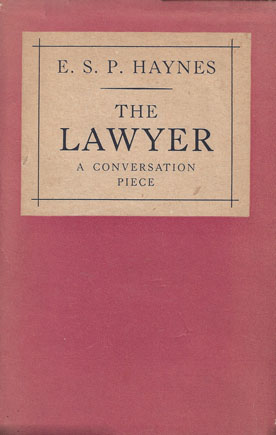
Out of Print
In January, 1949, died one of the livelier of the English eccentrics, E. S. P. Haynes, scholar of Eton and Balliol. He did not seek public eminence, but was content to join his father in a firm of family solicitors.
For a long time his brilliant gifts were exercised on the one hand in conversation and hospitality, and on the other in the struggle for individual liberty, a cause he championed in articles, in books and in membership of various societies.
In 1932 appeared an anonymous work entitled A Lawyer's Notebook which became a literary sensation. It was recognised that the writer's learning and wit and the strong and occasionally self-contradictory opinions so truculently expressed sprang from a personality unashamed to be itself in a standardised world.
Most of his friends realised, of course, that "the Lawyer" was E. S. P. Haynes. Haynes produced two further Notebooks some Victorian memoirs, a one-act 'play and various other volumes. Everything he wrote was marked unmistakably by his intransigeant individualism. Incapable of taking anything up by halves, he managed wholeheartedly to combine apparent opposites.
A Rationalist, he liked the company of Roman Catholics; an advocate of easier divorce, he agitated for financial legislation that should secure the position of the family. With Belloc he sang the praises of liberty, property and wine; and with H. G. Wells he kept up a friendship broken only by death. He had a gift for friendship-he could not suffer fools at all. Many of his judgments in the-early years of this century as to the way the world was going seem to have been prophetic.
A few months before his death he arranged with Eyre & Spottiswoode to produce a kind of anthology of his more permanent work, including memoirs of his parents and of late Victorian days, reminiscences of Eton and Balliol and anecdotes of his innumerable friends.
To this book he wrote a long and extremely characteristie introduction, but unfor¬tunately he did not live to see it through the press. This has been done by his daughter, Renee Haynes, well known herself as a writer and critic, and she has contributed the candid and touching memoir which prefaces this volume.
Publishers' Note The following selection from the writing of E.S.P. Haynes is taken from:-